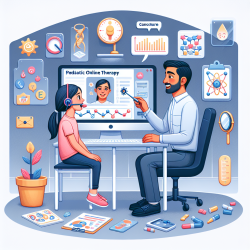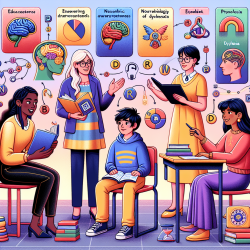Introduction
In the ever-evolving landscape of healthcare, the integration of clinical genomics and big data presents unique opportunities and challenges. A recent study titled "Clinical Genomics, Big Data, and Electronic Medical Records: Reconciling Patient Rights with Research When Privacy and Science Collide" sheds light on these complexities, particularly focusing on the balance between patient privacy and the advancement of scientific research. For practitioners in the field of speech-language pathology, especially those working with children, understanding and implementing insights from this research can significantly enhance therapeutic outcomes.
Understanding the Research
The study highlights the potential of electronic medical records (EMRs) as a vast resource for genomic data, which can be leveraged for research without explicit patient consent. This practice, while beneficial for advancing personalized medicine, raises significant privacy concerns. The authors argue for stricter regulations and suggest that genomic data should not be treated as de-identified information. They advocate for patient awareness and some level of control over the use of their genomic data.
Implications for Speech-Language Pathologists
For speech-language pathologists, particularly those providing online therapy services like TinyEYE, integrating genomic data into practice could revolutionize personalized treatment plans. Here’s how practitioners can leverage these insights:
- Data-Driven Decisions: Utilize genomic data to tailor therapy plans that address specific genetic predispositions affecting speech and language development.
- Enhanced Outcomes: By understanding genetic factors, therapists can predict and address potential challenges more effectively, improving overall therapy outcomes for children.
- Informed Consent: Ensure that parents and guardians are informed about how their child's genomic data might be used in research, emphasizing transparency and trust.
- Privacy Considerations: Advocate for policies that protect patient data, aligning with the study's recommendations for stricter privacy regulations.
Encouraging Further Research
While the integration of genomic data into speech therapy holds promise, it is crucial for practitioners to stay informed about ongoing research and developments in this area. Engaging with interdisciplinary teams, including geneticists and data scientists, can provide valuable insights and foster innovative approaches to therapy.
Conclusion
As we navigate the intersection of genomics, big data, and patient privacy, speech-language pathologists have a unique opportunity to enhance their practice and outcomes for children. By implementing data-driven strategies and advocating for ethical use of genomic data, practitioners can contribute to the advancement of personalized medicine in speech therapy.
To read the original research paper, please follow this link: Clinical genomics, big data, and electronic medical records: reconciling patient rights with research when privacy and science collide.










